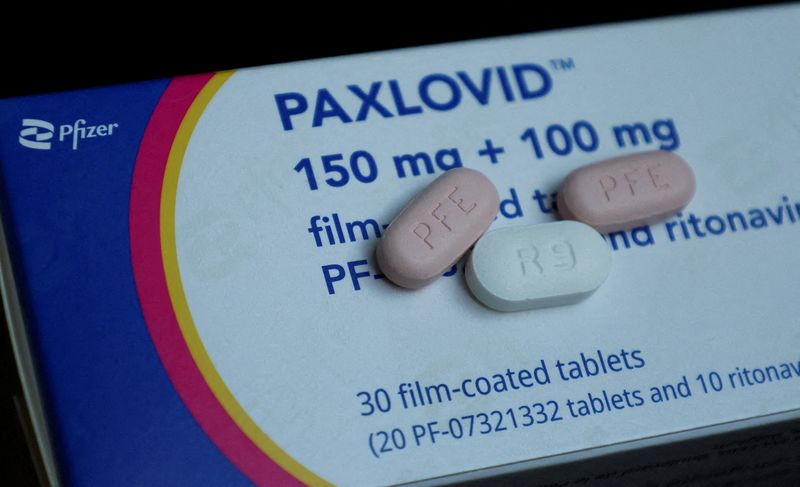By Bhanvi Satija and Michael Erman
(Reuters) - Pfizer (NYSE:PFE) on Tuesday urged investors to focus on growth in non-COVID products such as the new RSV vaccine Abrysvo as slumping demand for COVID-19 vaccines and treatments pushed the drugmaker to its first quarterly loss since 2019.
The company last month said it would take a $5.6 billion one-time charge to account for U.S. government returns of millions of doses of its antiviral treatment Paxlovid, as well as inventory of COVID vaccine Comirnaty.
The decline in use of COVID vaccines and products as the pandemic receded has fueled a 40% drop in Pfizer's shares this year and could remain a drag going forward, analysts have said. Shares were off about 1% in midday trading.
Pfizer is still going to be under pressure to meet its sales guidance for 2023, said BMO Capital analyst Evan Seigerman.
Sales of Paxlovid and the vaccine Pfizer makes with German partner BioNTech (NASDAQ:BNTX) had boosted revenue to record levels the last two years. However, annual vaccination rates have dropped sharply and demand for treatments has dipped as population-wide immunity levels increased.
"We have rebased our COVID expectations," CEO Albert Bourla said on a call to discuss quarterly results, adding that he believes revenue from those products will be stable going forward.
Pfizer continues to expect 2023 revenue growth of 6%-8% from non-COVID products, with a majority occurring in the second half.
Bourla pointed to 10% growth this quarter for non-COVID products both new and old, "and that positions us to be able to have a growing portfolio."
Sales of recently launched respiratory syncytial virus (RSV) vaccine Abrysvo were $375 million for the quarter.
"We're very early in the innings of this launch. We're doing better than we thought," said Pfizer's chief commercial officer Angela Hwang.
Even so, Pfizer's RSV shot is lagging behind a rival vaccine from GSK, which is the only one being carried by CVS the largest U.S. pharmacy chain.
Pfizer in an update said its experimental messenger-RNA influenza vaccine worked about as well as a licensed flu vaccine in a late-stage study of volunteers ages 18 to 64.
It said the vaccine hit secondary goals for influenza A strains, but not B strains of the virus.
The company also said it expects mid-stage data from experimental obesity pill danuglipron before the end of the year as it looks to compete in the industry's fastest growing market.
Pfizer is also hoping for growth from its $43 billion deal for cancer-therapy specialist Seagen, which has been cleared in Europe and is being reviewed by U.S. regulators.
Paxlovid sales slumped 97% in the third quarter to $202 million, while vaccine revenue of $1.31 billion was down from $4.4 billion a year earlier.
Analysts had expected $1.44 billion for the vaccine and $618.20 million from Paxlovid, according to LSEG data.
Pfizer, which announced a $3.5 billion cost-cutting program earlier this month, slashed $9 billion off its 2023 sales forecast after agreeing to take back nearly 8 million Paxlovid treatment courses from the U.S. government.
Pfizer expects Paxlovid to remain available for free to Americans through the end of the year.

The company posted a net loss of 42 cents per share for the third quarter. Excluding one-time items, Pfizer reported a loss of 17 cents per share compared with analysts' expectations for a loss of 34 cents, and a profit of $1.78 per share a year ago.
Overall revenue was $13.23 billion, down from to $22.64 billion a year ago.